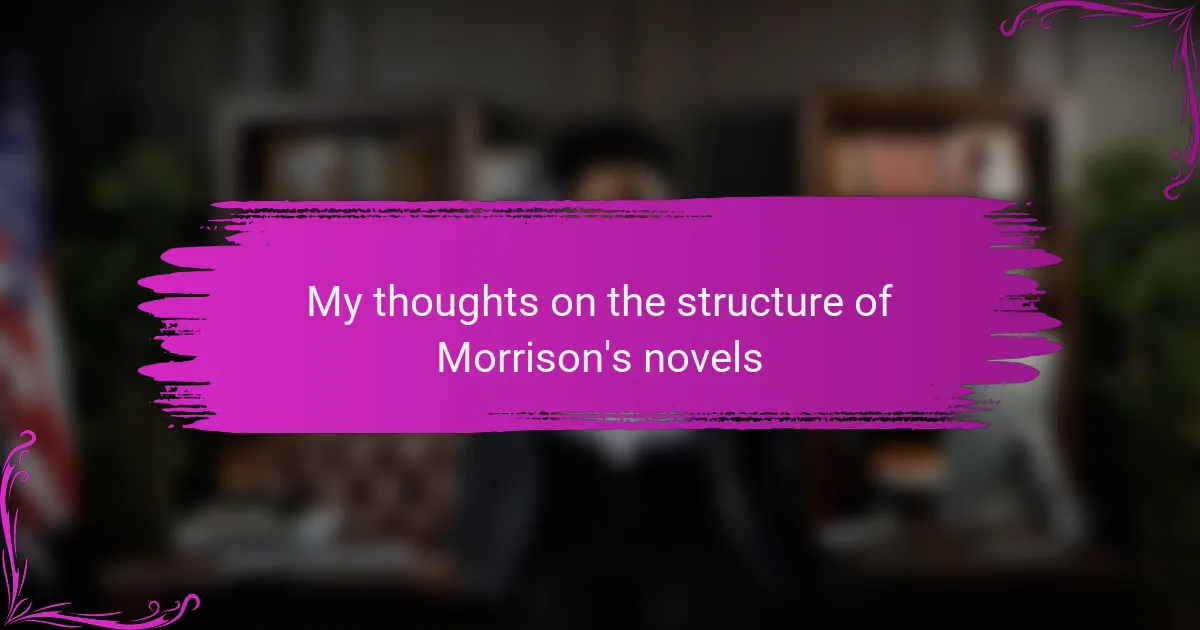Key takeaways
- Kafka’s work profoundly explores themes of alienation, absurdity, guilt, and authority, reflecting deep human emotions and societal struggles.
- His personal experiences, including his Jewish background and mental health challenges, significantly influenced the themes and characters in his narratives.
- Resources like “The Kafka Project” and “Letters to Felice” enhance understanding of Kafka’s literary context and personal struggles.
- The surreal elements in his writing invite readers to reflect on the nature of reality and identity, making his stories both thought-provoking and relatable.

Understanding Kafka’s Literary Impact
Kafka’s literary impact is profound and far-reaching, influencing not only the realm of literature but also the broader landscape of modern thought. I often find myself pondering, what is it about his work that resonates on such a deep emotional level? His exploration of existential themes often leaves me feeling both unsettled and reflective, pushing me to confront the absurdities of life.
I remember the first time I read “The Metamorphosis.” It was a strange mix of horror and sympathy, witnessing Gregor Samsa’s transformation. This moment sparked my curiosity about alienation and identity. I realized that Kafka’s characters often echo our own struggles, grappling with feelings of inadequacy and isolation in an indifferent world.
The unique ways in which Kafka portrays bureaucracy and authority have also had a lasting impact on literature and our societal perceptions. I can’t help but wonder how many readers have felt a sense of frustration akin to Kafka’s characters when facing a labyrinth of red tape in their own lives. His ability to capture the nuances of human psychology through surreal storytelling remains unparalleled, encouraging each of us to reflect on our existence in an increasingly complex world.

Key Themes in Kafka’s Work
When I first delved into Kafka’s stories, I was struck by the sense of alienation that permeates much of his work. It resonated with my own experiences of feeling out of place in various aspects of life. This theme of isolation not only reflects the struggles of individuals in a vast, often indifferent world, but it also highlights Kafka’s acute awareness of the human condition.
Another prominent theme in Kafka’s work is the absurdity of existence, which I found both unsettling and fascinating. I remember how reading “The Metamorphosis” left me grappling with the surreal transformation of Gregor Samsa into a giant insect. It made me reflect on the fragility of identity and the sometimes arbitrary nature of societal expectations.
Key Themes in Kafka’s Work:
– Alienation and isolation: Characters often find themselves estranged from family, society, and even their own identities.
– Absurdity of existence: Events often unfold in illogical ways, challenging the order and predictability we seek in life.
– Guilt and anxiety: Characters experience overwhelming feelings of guilt, often with little understanding of their origins.
– Authority and powerlessness: Kafka’s protagonists often confront large, faceless institutions that render them helpless.
– Transformation: The concept of change, whether physical or psychological, serves as a catalyst for existential exploration.

Influences on Kafka’s Writing Style
Kafka’s writing style is undoubtedly shaped by his turbulent personal experiences and the societal themes of his time. I often think about how his Jewish background in a predominantly Catholic society influenced his sense of alienation, which permeates his stories. Reflecting on this, I realize that the clash between personal and collective identity is a powerful element of his narrative style.
Moreover, Kafka was deeply influenced by the intellectual currents of early 20th-century Europe, particularly existentialism. Reading his works, I find myself grappling with that sense of absurdity—how life can seem both nonsensical and painfully real. This philosophical backdrop adds a layer of complexity to his characters’ struggles, allowing me to connect on a deeper level with their quest for meaning.
The surreal elements in Kafka’s writing also arise from his fascination with dreams. When I read about his exploration of subconscious fears, it reminds me of my own vivid dreams that sometimes feel like reflections of my waking anxieties. This dreamlike quality in his stories makes me question how much of our reality is shaped by our inner turmoil, drawing me further into Kafka’s unique literary world.

Resources for Studying Kafka
In my quest to understand Kafka better, I’ve stumbled upon a variety of resources that truly enriched my reading experience. A fantastic starting point is “The Kafka Project,” available online, which provides a wealth of scholarly articles and analyses on his works. I remember the first time I navigated through this resource, feeling a sense of discovery as I gained insights into the complexities of his narratives. Have you ever found a piece of analysis that completely changed how you viewed a story? That was my experience with this site.
Another invaluable resource is the collection of his letters, particularly “Letters to Felice.” Reading these letters allowed me to glimpse into Kafka’s personal struggles and revelations. It’s fascinating how his correspondence can shed light on his emotional state, offering context to the themes I encountered in his fiction. I often reflect on how knowing the author’s background can deepen the appreciation for their work—do you find that to be true as well?
Lastly, if you’re looking for a more structured approach, I highly recommend exploring a companion book like “Kafka: A Very Short Introduction.” I still recall the clarity it brought to my understanding of his themes and style. The straightforward explanations and concise discussions helped me engage with his stories on a whole new level. It’s always enlightening to have a guide alongside, isn’t it? These resources collectively offer a deeper dive into Kafka’s world, making the exploration both enriching and enjoyable.

Analyzing Kafka’s Characters
Kafka’s characters are often a mirror reflecting the inner struggles of humanity. Take Gregor Samsa from “The Metamorphosis” as an example. I remember feeling a deep sorrow as I watched his family’s reaction to his transformation. It made me question how we treat those who don’t fit into societal norms. This character embodies the heart-wrenching experience of alienation, which strikes a chord with anyone who has ever felt misunderstood or rejected.
Lurking beneath the surface of Kafka’s characters is a profound sense of guilt and anxiety. In “The Trial,” Josef K. finds himself entangled in an incomprehensible legal system, leaving him perplexed and powerless. I felt a chill run down my spine while reading about his plight. It reminded me of those moments in life when you’re left grappling with unforeseen consequences, feeling as though the universe is conspiring against you. Kafka captures that weight of despair with a remarkable understanding of human emotion.
Another layer to Kafka’s characters is their confrontation with authority. Their interactions with faceless bureaucratic systems highlight a struggle for autonomy. Reading about these power dynamics often makes me reflect on my own experiences with institutions, evoking a sense of frustration that resonates deeply. Have you ever felt like a mere cog in a machine? Kafka’s characters invite us to examine these feelings and challenge the structures that confine us, making each story both unsettling and thought-provoking.

Personal Reflections on Kafka’s Influence
As I delved deeper into Kafka’s world, I often found myself reflecting on how his tumultuous life experiences shaped his narratives. It’s fascinating to consider how his struggles with identity, isolation, and authority resonate in stories like “The Metamorphosis.” I remember the first time I read it; the raw emotion of Gregor Samsa’s transformation mirrored feelings I had of being misunderstood in my own life.
In my quest to understand Kafka better, I noted several key influences that seem to permeate his work:
- Personal Struggles: Kafka’s battles with mental health and family expectations echo loudly in his characters.
- Social Context: Living in a time of political unrest in Austria-Hungary, Kafka captured the anxieties of his era, reflecting feelings of alienation.
- Literary Influences: The existential philosophy of his time shaped his narratives, prompting readers to ponder deeper questions about existence and purpose.
- Dream-like Logic: Many of his stories reflect a dream-like state, which I find captivating as it blurs the lines between reality and surrealism, inviting multiple interpretations.
- Isolation: His exploration of isolation struck a personal chord with me, reminding me of moments in my life when I felt disconnected from others.




